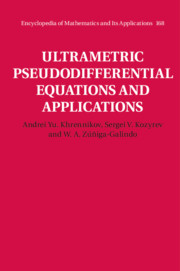Book contents
- Frontmatter
- Dedication
- Contents
- Preface
- 1 p-Adic Analysis: Essential Ideas and Results
- 2 Ultrametric Geometry: Cluster Networks and Buildings
- 3 p-Adic Wavelets
- 4 Ultrametricity in the Theory of Complex Systems
- 5 Some Applications of Wavelets and Integral Operators
- 6 p-Adic and Ultrametric Models in Geophysics
- 7 Recent Development of the Theory of p-Adic Dynamical Systems
- 8 Parabolic-Type Equations, Markov Processes, and Models of Complex Hierarchical Systems
- 9 Stochastic Heat Equation Driven by Gaussian Noise
- 10 Sobolev-Type Spaces and Pseudodifferential Operators
- 11 Non-Archimedean White Noise, Pseudodifferential Stochastic Equations, and Massive Euclidean Fields
- 12 Heat Traces and Spectral Zeta Functions for p-Adic Laplacians
- References
- Index
11 - Non-Archimedean White Noise, Pseudodifferential Stochastic Equations, and Massive Euclidean Fields
Published online by Cambridge University Press: 10 May 2018
- Frontmatter
- Dedication
- Contents
- Preface
- 1 p-Adic Analysis: Essential Ideas and Results
- 2 Ultrametric Geometry: Cluster Networks and Buildings
- 3 p-Adic Wavelets
- 4 Ultrametricity in the Theory of Complex Systems
- 5 Some Applications of Wavelets and Integral Operators
- 6 p-Adic and Ultrametric Models in Geophysics
- 7 Recent Development of the Theory of p-Adic Dynamical Systems
- 8 Parabolic-Type Equations, Markov Processes, and Models of Complex Hierarchical Systems
- 9 Stochastic Heat Equation Driven by Gaussian Noise
- 10 Sobolev-Type Spaces and Pseudodifferential Operators
- 11 Non-Archimedean White Noise, Pseudodifferential Stochastic Equations, and Massive Euclidean Fields
- 12 Heat Traces and Spectral Zeta Functions for p-Adic Laplacians
- References
- Index
Summary
Introduction
There are general arguments that suggest that one cannot make measurements in regions of extent smaller than the Planck length ≈ 10−33 cm, see e.g. [413] and the references therein. The construction of physical models at the level of the Planck scale is a relevant scientific problem and a very important area of mathematical research. In [436]–[438], I. Volovich conjectured the non-Archimedean nature of space-time at the level of the Planck scale. This conjecture has given rise to a lot of research, for instance, in quantum mechanics, see e.g. [222], [430], [433], [456], [457], in string theory, see e.g. [91], [163], [175], [431], [425], [427], and in quantum field theory, see e.g. [280], [344], [396]. On the other hand, the interaction between quantum field theory and mathematics is very fruitful and deep, see e.g. [167], [171], [213], [220], [219], [444], [445], among several articles. Let us mention explicitly the connection with arithmetic, see e.g. [213], [308], [371]. From this perspective the investigation of quantum fields in a non-Archimedean setting is quite a natural problem.
In this chapter we present a class of non-Archimedean Euclidean fields, in arbitrary dimension, which are constructed as solutions of certain covariant p-adic stochastic pseudodifferential equations, by using techniques involving white-noise calculus. This chapter is based on [472]. The connection between quantum fields and SPDEs has been studied intensively in the Archimedean setting, see e.g. [9]–[30] and the references therein. A massive non-Archimedean field ϕ is a random field parametrized by, the nuclear countably Hilbert spaces introduced in Chapter 10, which depends on (q, l,m, α), where q is an elliptic quadratic form, l is an elliptic polynomial, and m and α are positive numbers. Here m is the mass of ϕ. Heuristically, is the solution of (Lα + m2), where is a generalized Levy noise. This type of noise is introduced in this chapter. Here, where Fq := F is the Fourier transform defined using the bilinear symmetric form corresponding to the quadratic form q. However, in this chapter we work with Fourier transforms defined by using arbitrary bilinear forms.
- Type
- Chapter
- Information
- Ultrametric Pseudodifferential Equations and Applications , pp. 177 - 197Publisher: Cambridge University PressPrint publication year: 2018



